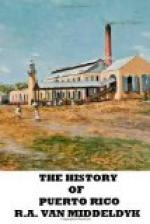The desire for intellectual improvement began to manifest itself in the interior of the island a few years after the establishment of the first public library in the capital. The municipality of Ponce founded a library in 1894. It contains 809 bound volumes and 669 pamphlets in English, German, French, and Spanish, many of them duplicates. The general condition of the books is bad, and the location of the library altogether unsuitable. There was a municipal appropriation of 350 pesos per annum for library purposes, but since 1898 it has not been available.
Mayaguez founded its public library in 1872. It possesses over 5,000 volumes, with a small archeological and natural history museum attached to it.
Some of the smaller towns also felt the need of intellectual expansion, and tried to supply it by the establishment of reading-rooms. Arecibo, Vega-Baja, Toa-Alta, Yauco, Cabo-Rojo, Aguadilla, Humacao, and others made efforts in this direction either through their municipalities or private initiative. A few only succeeded, but they did not outlive the critical times that commenced with the war, aggravated by the hurricane of August, 1898.
* * * * *
Since the American occupation of the island, four public libraries have been established. Two of them are exclusively Spanish, the Circulating Scholastic Library, inaugurated in San Juan on February 22, 1901, by Don Pedro Carlos Timothe, and the Circulating Scholastic Library of Yauco, established a month later under the auspices of S. Egozene of that town. The two others are, one, largely English, the Pedagogical Library, established under the auspices of the Commissioner of Education, and the San Juan Free Library, to which Mr. Andrew Carnegie has given $100,000, and which is polyglot, and was formally opened to the public April 20, 1901. There is also a growing number of libraries in the public schools. From the above data it appears that, owing to the peculiar conditions that obtained in this island, the people of Puerto Rico were very slow in joining the movement of intellectual expansion which began in Spanish America in the eighteenth century. They did so at last, unaided and with their own limited resources, even before the obstacles placed in their way by the Government were removed. If they have not achieved more, it is because within the last few decades the island has been unfortunate in more than one respect. Now that a new era has dawned, it may reasonably be expected that the increased opportunities for intellectual development afforded them will be duly appreciated and taken advantage of by the people, and if we may judge from the eagerness with which the youth of the capital reads the books of the San Juan Free Library, it seems clear that the seed so recently sown has fallen in fruitful soil.
* * * * *




